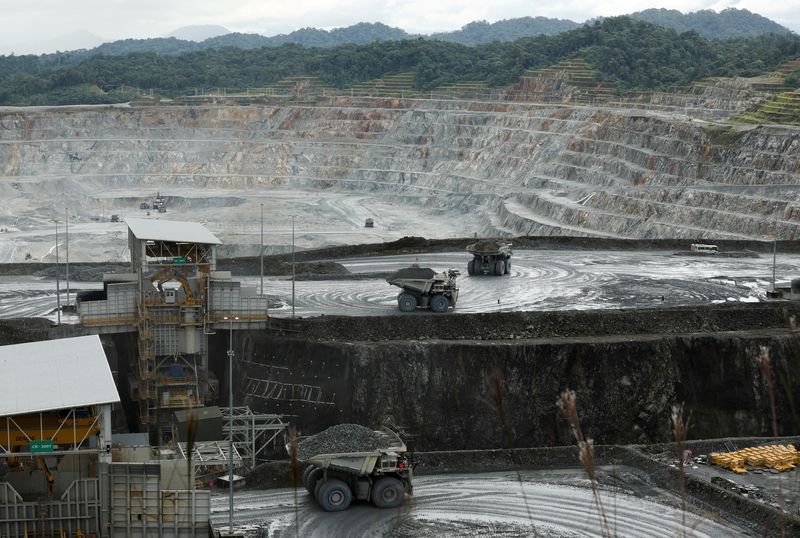By Valentine Hilaire
PANAMA CITY (Reuters) -Panama and First Quantum Minerals are hardening battle lines in a dispute over how much tax the Canadian miner should pay on its concession for the Central American country's only major copper mine in operation, a key asset for both parties.
First Quantum's Chief Executive Tristan Pascall flew to Panama over Christmas and met with government officials for talks. However, no agreement was forthcoming, prompting the two sides to raise the stakes to protect their interests in the mine, known as Cobre Panama.
The dispute, which began at the end of 2021, has become a litmus test of Panama's ability to remain attractive to business even as the government seeks to reduce inequality by reviewing longterm deals that many analysts regard as too generous to business.
"Cobre Panama is the only metal mine operating in the country and many foreign companies started operations in Panama with its arrival. What happens will have a huge impact that seems to have not been properly weighed by both parties," said Zorel Morales, director of Panama's mining chamber.
Failure to reach a deal could spook foreign investors at a time when Panama is looking to develop three other copper deposits that could bring in investments similar to Cobre Panama's, said Morales.
Panama's demand that the company pay at least $375 million in annual tax has been at the center of the dispute, and during last week's talks First Quantum raised points it wanted included in its contract after a Dec. 14 deadline to reach agreement expired, according to a source linked to the government.
Exclusive rights to explore other minerals, enlarge the area of its concession, a $1 billion tax credit for its investment and a demand that no laws enacted after the new contract affect its operations were among the issues raised, the source said.
The company declined to comment on details of the negotiations. A spokesperson for the government did not reply to a request for comment.
Panamanian President Laurentino Cortizo said on Monday the government had presented a final contract offer to the company.
On Tuesday, lawmakers voted to summon the country's commerce and industry minister and environment minister to answer questions on the company, covering operating permits, royalties, sanctions for environmental offences and the progress of negotiations on the new contract.
The company did not immediately reply to a request for comment.
First Quantum paid $61 million in royalties to Panama's government in 2021, while the Cobre Panama mine posted sales revenues of $3.2 billion for the year, company data showed.
Meanwhile, other businesses circle the mine, which started production in 2019. Government records show at least two requests are under review to explore gold and other metals near First Quantum's concession.
Both parties have publicly said they want to strike a deal, but their failure to do so before the latest government deadline expired prompted Panama to order a halt to the mine's operations and the company to start arbitration proceedings.
LUCRATIVE ASSET
In 2021, Cobre Panama represented more than half of First Quantum's earnings before interest, tax depreciation and amortization (EBITDA). It also accounts for about 3.5% of Panama's gross domestic product.
The firm has invested over $10 billion in the mine and paid only nominal dividends to shareholders during its initial years, according to company data.
Cobre Panama represents about 40,000 direct and indirect jobs, interacts with some 1,800 suppliers and is the country's biggest private investment, according to business adviser Rene Quevedo, from consultancy GS&S Consultores.
Mining was the country's most dynamic sector during 2021, more than doubling in output. Fitch Ratings revised Panama's credit outlook to stable from negative in February, highlighting booming copper exports.
The mining row could hamper government plans as Cortizo wants to pump some $190 million from the miner's annual payments into Panama's national pension scheme, which risks running out of funds in 2024, according to the International Labor Organization.
"If there's no agreement, the damage would be serious," Quevedo said.
The company has said the cost of halting operations remains "uncertain". Cortizo's government has not disclosed any assessment of how the dispute could affect Panama.
Panama's government says it is prepared to face all legal scenarios to defend the national interest.

"It's a Panama Canal type of negotiation," said Hernan Arboleda, director of public policies at the economy and finance ministry, pointing to the country's experience in negotiating with the United States to secure control of its famous waterway.
"Panama can demonstrate to international authorities that this is not an equitable contract," he told Reuters.